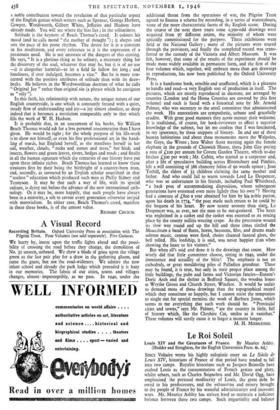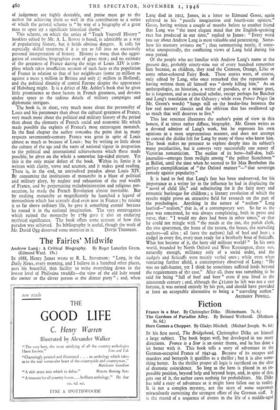Le Roi Soleil
Louis XIV and the Greatness of France. By Maurice Ashley. (Hodder and Stoughton, for the English Universities Press. 4s. 6d,) Louis XIV and the Greatness of France. By Maurice Ashley. (Hodder and Stoughton, for the English Universities Press. 4s. 6d,) SINCE Voltaire wrote his highly eulogistic essay on Le Siecle de Louis XIV, historians of France of that period have tended to fall into two camps. Royalist historians such as Jacques Bainville have exalted Louis as the consummation of French genius and glory, whilst others, such as Charles Seignobos and Mr. David Ogg, have emphasised the personal mediocrity of Louis, the great debt he owed to his predecessors, and the exhaustion and misery brought to the people of France by his wasteful administration and incessant wars. Mr. Maurice Ashley has striven hard to maintain a judicious balance between these two camps. Such impartiality and balance of judgement are highly desirable, and praise must go to the author for achieving them so well in this contribution to a series of which the general scheme is " by way of a biography of a great man to open up a significant historical theme."
This scheme, on which the series of " Teach Yourself History " booklets edited by Mr. A. L. Rowse is based, is admirable as a way of popularising history, but it holds obvious dangers. It calls for especially skilful treatment if it is not to fall into an excessively personal interpretation of history. History is more than the aggre- gation of countless biographies even of great men ; and no estimate of the greatness of France during the reign of Louis XIV is com- plete which takes insufficient account of such facts as the population of France in relation to that of her neighbours (some 20 million as against a mere 5 million in Britain and only 2 million in Holland), and the political disunity of central Europe despite the appearance of Habsburg might. It is a defect of Mr. Ashley's book that he gives little prominence to these factors in French greatness, and devotes undue space to the tedious details of military campaigns and diplomatic intrigues.
The book is, in short, very much more about the personality of Louis and his paramours than about the cultural greatness of France, very much more about the political and military history of the period than about the elements of French social and economic life which made possible the exploits of France's most extravagant monarch. In the final chapter the author concedes the point that in many respects seventeenth-century France was great in spite of Louis almost as much as because of Louis: but by writing so little about the culture of the age and the roots of national vigour in proportion to the political and international achievements which these made possible, he gives on the whole a somewhat lop-sided picture. Yet this is the only major defect of the book. Within its limits it is written with clarity, verve and acumen, and it makes good reading. There is, in the end, an unresolved paradox about Louis XIV. By consuming the institutions of monarchy in a blaze of political and military glory, by neglect and exhaustion of the real wealth of France, and by perpetuating maladministration and religious per- secution, he made the French Revolution almost inevitable. But by exalting monarchy so magnificently he launched a legend of monarchism which has scarcely died even now in France ; by raising it so far above ordinary life, he gave it something eternal because he rooted it in the national imagination. The very extravagance which ruined the monarchy by 1789 gave it also an enduring mythical significance. The book offers some account of how this paradox was achieved. Its bibliography is useful, though the work of Mr. David Ogg deserved some mention in it. DAVID THOMSON.



































 Previous page
Previous page